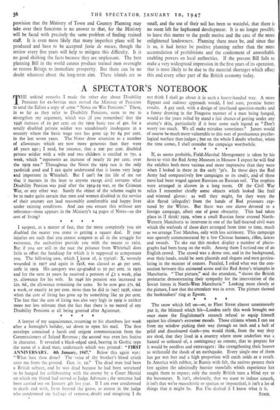A lawyer of my acquaintance, returning to his chambers last
week after a fortnight's holiday, sat down to open his mail. The first envelope contained a harsh and exigent communication from the Commissioners of Inland Revenue ; the second was even less festive in character. It revealed a black-edged card, bearing in Gothic type the name of a dead man, underneath which was printed : " FIRST ANNIVERSARY. 4th January, 1947." Below this again was : " What hast thou done? The voice of thy brother's blood crieth unto me from the ground. Gen. iv. so." The dead man had been a British subject, and he was dead because he had been sentenced to be hanged for collaborating with the enemy by a Court Martial on which my friend had served as Judge Advocate ; the sentence had been carried out on January 4th last year. If I am ever condemned to death and wish, from beyond the grave, to arouse in the judge who condemned me feelings c•f remorse, doubt and misgiving I do
not think I shall go about it in such a heavy-handed way. A more flippant and indirect approach would, I feel sure, promise better results. A gay card, with a design of interlaced question-marks and a funny drawing in the Fougasse manner of a man being hanged, would as the years rolled by stand a fair chance of getting under any enemy's skin, particularly if it bore some such legend as " Don't worry too much. We all make mistakes sometimes." Jurors would of course be much more' vulnerable to this sort of posthumous psycho- logical warfare than judges ; but on the whole I doubt whether, when the time comes, I shell consider the campaign worthwhile. * * * *


































 Previous page
Previous page